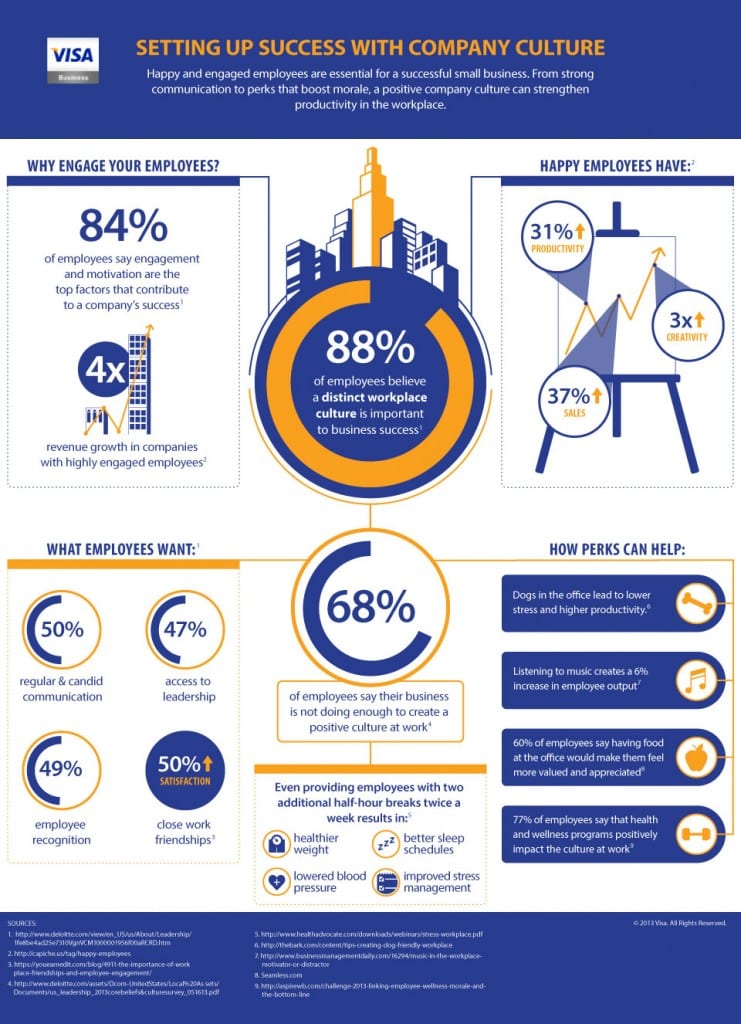Sponsored by VISA Business:
Why Internal Branding Matters to Corporate Culture and Business Success
What does your brand promise to consumers? Do your employees believe your brand promise? If not, why should consumers believe it?
Internal branding should be a core component of every company’s culture because your employees are your best brand advocates. However, they won’t be motivated to advocate the brand if they don’t believe in it or understand the brand promise. If their experience as an employee is different from the promise made to consumers, your company won’t get the buzz from employees that you want and could end up getting negative publicity at the hands of disgruntled employees.
Bottom line, your brand promise should be ingrained in your company culture and should guide every decision made that affects employees. They’re a critical component of brand success. Unfortunately, this critical step is skipped by many companies.
Do Your Research First
Before you can expect your employees to advocate your brand, you have to learn how they feel about the brand, what it means to them, and what it means to consumers. Look for inconsistencies and problems. At the same time, look for opportunities to change perceptions.
It’s crucial that employees are allowed to provide honest feedback without the fear of retribution. It’s also crucial that you analyze the research results through an unbiased lens. You should never assume that you know how your employees feel about your brand or what they think it means, because you don’t. Ask probing questions to identify strengths and weaknesses in your internal brand education and company culture.
Educate Employees about the Brand
Once you’ve conducted your research, you’ll be able to determine where things are going wrong and develop processes to redesign the corporate culture so employees are more likely to believe in the brand promise and advocate the brand. Not only do you need to educate existing employees about your brand, but this education also needs to become a core component of new employee training during the onboarding process. Furthermore, continuing education is essential as the company and brand evolve.
Keep in mind, internal brand education isn’t just about formal courses and training sessions. It’s about creating a working environment, company policies, and so on that all support the brand promise. If one piece of the corporate culture is inconsistent with the brand promise, employees will become confused and ultimately doubt the brand and the company.
Involve Employees and Make Them Care about the Brand
Your company’s marketing department invests a lot of money each year in communicating the brand promise to consumers, making them believe in that promise, and delivering on that promise in every interaction. You need to create similar internal experiences so your employees believe the brand promise and develop an emotional connection to it beyond their paycheck.
Prove to your employees that the company and brand are as great as the marketing team tells consumers they are. Walk the walk by providing opportunities for them to live and support the brand promise. Your corporate culture should enhance your business, not detract from it. It’s up to the leadership team to ensure that happens by making internal brand building a strategic imperative.
You can learn more about company culture in the infographic below:
I am blogging on behalf of Visa Business and received compensation for my time from Visa for sharing my views in this post, but the views expressed here are solely mine, not Visa’s. Visit http://facebook.com/visasmallbiz to take a look at the reinvented Facebook Page: Well Sourced by Visa Business. The Page serves as a space where small business owners can access educational resources, read success stories from other business owners, engage with peers, and find tips to help businesses run more efficiently. Every month, the Page will introduce a new theme that will focus on a topic important to a small business owner’s success. For additional tips and advice, and information about Visa’s small business solutions, follow @VisaSmallBiz and visit http://visa.com/business.





